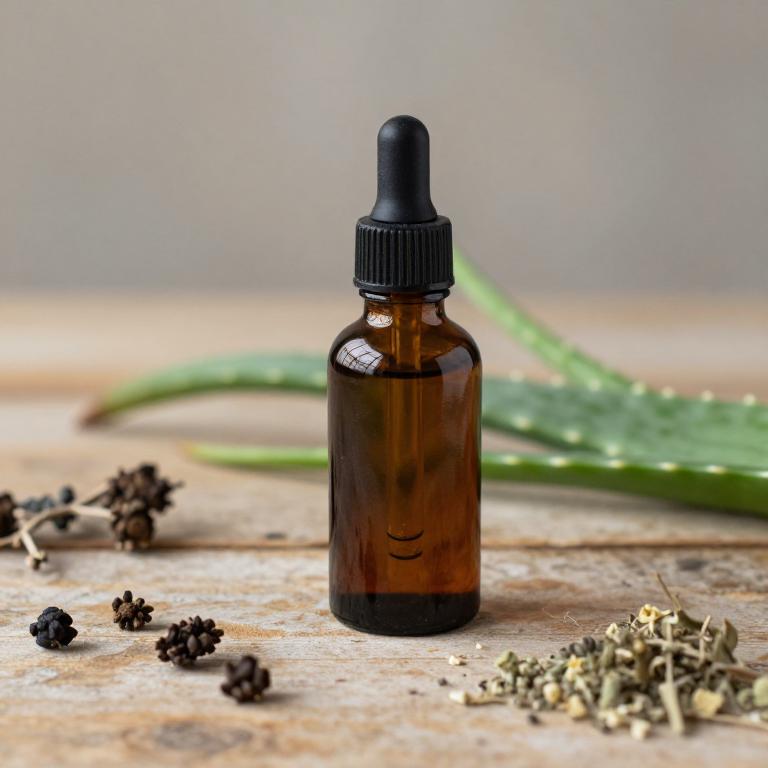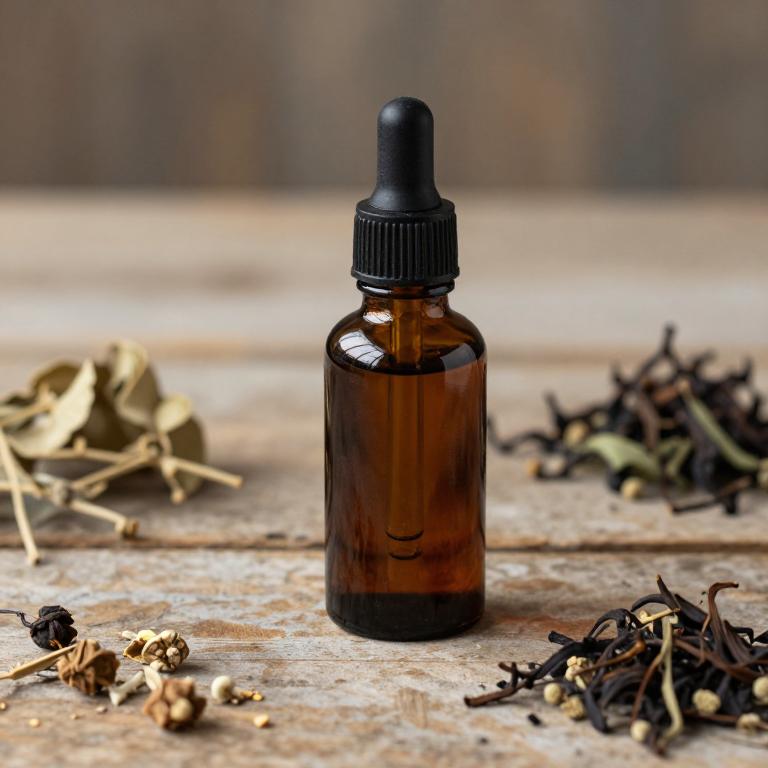10 Best Herbal Tinctures For Ulcerative Colitis

Herbal tinctures have gained attention as potential complementary therapies for managing symptoms of ulcerative colitis, an inflammatory bowel disease characterized by chronic inflammation of the colon.
These tinctures typically contain a blend of herbs such as licorice root, turmeric, and black pepper, which are believed to possess anti-inflammatory and antimicrobial properties. Some studies suggest that certain herbs may help reduce intestinal inflammation and support gut healing, although more clinical research is needed to confirm their efficacy. While herbal tinctures may offer relief for some individuals, they should not replace conventional medical treatments and should be used under the guidance of a healthcare professional.
It is important to consult with a qualified practitioner to ensure safe and appropriate use, especially since some herbs can interact with medications or have side effects.
Table of Contents
- 1. Turmeric (Curcuma longa)
- 2. Thistle (Silybum marianum)
- 3. Licorice (Glycyrrhiza glabra)
- 4. Aloe vera (Aloe barbadensis)
- 5. Ginger (Zingiber officinale)
- 6. Camellia (Camellia sinensis)
- 7. Stinging nettle (Urtica dioica)
- 8. Echinacea (Echinacea purpurea)
- 9. Thyme (Thymus vulgaris)
- 10. Blessed thistle (Cnicus benedictus)
1. Turmeric (Curcuma longa)

Curcuma longa, commonly known as turmeric, has been traditionally used for its anti-inflammatory and antioxidant properties, making it a potential natural remedy for ulcerative colitis, an inflammatory bowel disease.
Curcuma longa herbal tinctures are concentrated liquid extracts that provide a bioavailable form of curcumin, the active compound responsible for many of its therapeutic effects. These tinctures may help reduce inflammation in the colon, alleviate symptoms such as abdominal pain and diarrhea, and support the healing of the intestinal lining. However, while preliminary studies show promise, more clinical research is needed to fully understand their efficacy and safety in managing ulcerative colitis.
As with any supplement, it is advisable to consult a healthcare provider before incorporating curcuma longa tinctures into a treatment regimen.
2. Thistle (Silybum marianum)

Silybum marianum, commonly known as milk thistle, is a herbal remedy that has been studied for its potential benefits in managing ulcerative colitis, an inflammatory bowel disease.
The active compound in milk thistle, silymarin, is believed to possess anti-inflammatory and antioxidant properties that may help reduce intestinal inflammation and support liver function. Some preliminary research suggests that silybum marianum tinctures could help alleviate symptoms such as diarrhea and abdominal pain associated with ulcerative colitis. However, more clinical trials are needed to confirm its efficacy and safety in this specific condition.
As with any herbal supplement, it is advisable to consult a healthcare professional before using silybum marianum tinctures, especially for individuals with chronic digestive conditions.
3. Licorice (Glycyrrhiza glabra)

Glycyrrhiza glabra, commonly known as licorice root, has been traditionally used in herbal medicine for its anti-inflammatory and soothing properties.
Herbal tinctures made from Glycyrrhiza glabra are often explored as complementary therapy for ulcerative colitis due to their potential to reduce intestinal inflammation and mucosal damage. These tinctures contain compounds like glycyrrhizin, which may help in modulating immune responses and protecting the lining of the colon. However, long-term use of licorice tinctures can lead to side effects such as hypertension and electrolyte imbalances, so they should be used under the guidance of a healthcare professional.
Despite these considerations, some patients report symptom relief and improved gut health when incorporating licorice tinctures into their treatment regimen.
4. Aloe vera (Aloe barbadensis)

Aloe barbadensis, commonly known as aloe vera, has been traditionally used for its soothing and anti-inflammatory properties, making it a potential candidate for herbal tinctures aimed at managing ulcerative colitis.
These tinctures are typically prepared by extracting the gel from the aloe leaf and combining it with alcohol to create a concentrated form that can be taken orally. Some studies suggest that aloe vera may help reduce inflammation in the colon, alleviate symptoms such as diarrhea and abdominal pain, and promote tissue repair in the gastrointestinal tract. However, while anecdotal evidence and preliminary research show promise, more rigorous clinical trials are needed to confirm its efficacy and safety for individuals with ulcerative colitis.
As with any herbal remedy, it is important to consult a healthcare provider before incorporating aloe barbadensis tinctures into a treatment regimen for this condition.
5. Ginger (Zingiber officinale)

Zingiber officinale, commonly known as ginger, has been traditionally used for its anti-inflammatory and digestive properties, and its herbal tinctures are increasingly being explored for their potential benefits in managing ulcerative colitis.
The active compounds in ginger, such as gingerol and shogaol, are believed to help reduce intestinal inflammation and oxidative stress, which are key factors in the progression of ulcerative colitis. Studies suggest that ginger tinctures may support gut health by enhancing mucosal integrity and modulating the immune response, though more clinical research is needed to confirm these effects. When used as a complementary therapy, ginger tinctures may help alleviate symptoms such as abdominal pain and diarrhea, but they should not replace conventional medical treatments.
As with any herbal remedy, it is important to consult with a healthcare provider before incorporating ginger tinctures into a treatment plan for ulcerative colitis.
6. Camellia (Camellia sinensis)

Camellia sinensis, commonly known as the plant source of green and black tea, has been explored for its potential therapeutic effects in managing ulcerative colitis, an inflammatory bowel disease characterized by chronic inflammation of the colon.
Herbal tinctures derived from Camellia sinensis are believed to contain bioactive compounds such as polyphenols, catechins, and antioxidants that may help reduce inflammation and oxidative stress in the gastrointestinal tract. These tinctures are often used as complementary therapies alongside conventional treatments to support gut health and alleviate symptoms like diarrhea and abdominal pain. While preliminary studies suggest promising anti-inflammatory properties, more research is needed to establish their efficacy and safety in clinical settings for ulcerative colitis patients.
Overall, Camellia sinensis tinctures may offer a natural approach to managing the condition, though they should be used under the guidance of a healthcare professional.
7. Stinging nettle (Urtica dioica)

Urtica dioica, commonly known as stinging nettle, has been traditionally used in herbal medicine for its anti-inflammatory and detoxifying properties.
When prepared as a tincture, Urtica dioica may support gut health by reducing inflammation in the digestive tract, which is beneficial for individuals with ulcerative colitis. The tincture is typically made by soaking the dried leaves in alcohol to extract its active compounds, such as flavonoids and minerals. Some studies suggest that nettle may help regulate bowel movements and ease symptoms like diarrhea and abdominal pain.
However, it is important to consult a healthcare provider before using Urtica dioica tinctures, as they may interact with other medications or have side effects for some individuals.
8. Echinacea (Echinacea purpurea)

Echinacea purpurea, commonly known as purple coneflower, is a traditional herbal remedy that has been studied for its potential anti-inflammatory and immune-modulating properties.
While it is often used to support immune function and reduce the duration of colds, its application in managing ulcerative colitis, an inflammatory bowel disease, has garnered interest among researchers and herbalists. Some preliminary studies suggest that echinacea tinctures may help reduce inflammation in the colon by inhibiting pro-inflammatory cytokines, though more clinical trials are needed to confirm these effects. As a herbal tincture, echinacea purpurea is typically prepared by soaking the dried plant material in alcohol, allowing for easy absorption and bioavailability.
However, individuals with ulcerative colitis should consult with a healthcare provider before using echinacea, as it may interact with other medications or exacerbate gastrointestinal symptoms in some cases.
9. Thyme (Thymus vulgaris)

Thymus vulgaris, commonly known as thyme, is a herb that has been traditionally used for its medicinal properties, including its potential benefits for digestive health.
Herbal tinctures made from thymus vulgaris are often used in alternative medicine to support the treatment of inflammatory bowel conditions like ulcerative colitis. These tinctures contain essential oils and phytochemicals that may help reduce inflammation and promote gut healing. Some studies suggest that thyme may have antimicrobial and antioxidant effects that could aid in managing ulcerative colitis symptoms.
However, it is important to consult with a healthcare provider before using thymus vulgaris tinctures, as they may interact with other medications or have side effects.
10. Blessed thistle (Cnicus benedictus)

Cnicus benedictus, commonly known as St. Benedict's thistle, has been traditionally used in herbal medicine for its potential anti-inflammatory and digestive properties.
Herbal tinctures made from Cnicus benedictus are often considered for their ability to support gut health and may be used as a complementary therapy for conditions like ulcerative colitis. The active compounds in the plant, including flavonoids and essential oils, are believed to help reduce intestinal inflammation and promote healing of the colon lining. While some preliminary studies suggest possible benefits, it is important to consult with a healthcare professional before using these tinctures as part of a treatment plan for ulcerative colitis.
Due to the variability in individual responses and potential interactions with other medications, Cnicus benedictus tinctures should not replace conventional medical treatments.